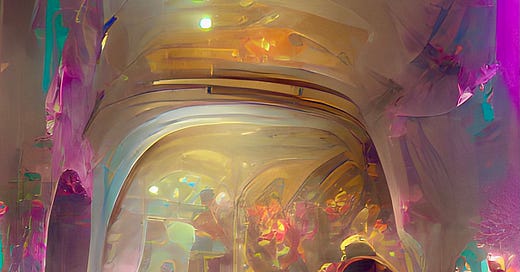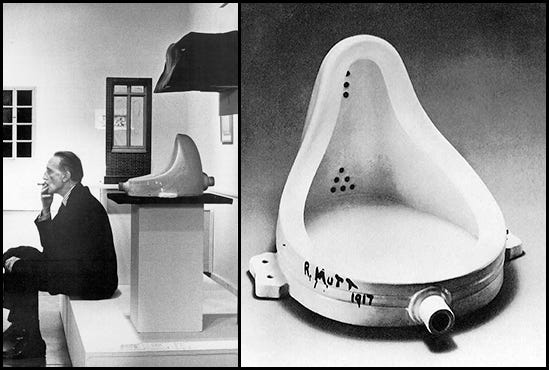Alexander Solzhenitsyn said that Godlessness is the first step towards tyranny and oppression. And in some ways we can interpret a shift toward Godlessness through the lens we have been looking - the left/right hemispheres of the brain1. In some ways this is the continuation of what I had previously posted here -
While the ages of Reformation and Enlightenment did nothing to promote the transcendent and religious perspectives on life, we did see the era of Romanticism bring back a sense of awe, the holy, and the panentheistic2. But the 20th Century until now has seen a swing once again toward a left hemisphere perception of the world, a perception that does not comprehend the transcendent, and would rather explain it away or make a mockery of it:
When the Stalinists replaced the cathedral of Our Lady of Kazan in Moscow with a public lavatory, the left hemisphere (never subtle with it comes to metaphoric thinking) pissed on religion, as it has pissed on art when Marcel Duchamp exhibited his notorious urinal3 (interestingly one of the charges against the Puritan Cromwell was that his troops used religious buildings as lavatories). The persistence of this left-hemisphere metaphor, such as it is, of urine and faeces in modern art would be remarkable, if one did not know that the left hemisphere lacks metaphorical subtlety and is highly conventional. (McGilchrist, 2009, p. 441)
Not only has it been those obviously opposed to organised religion during the 20th Century who have been attacking spirituality but even the Church itself may be undermining itself - “attributing material answers to spiritual problems” as McGilchrist suggests. There is so much of spiritual truth which is… well, spiritual. It’s spiritually discerned and most likely does not have the same, or any, utility as the left hemisphere values4. Everything, it seems, has to make sense in a practical, logical, linear fashion, or else “God is dead”, or we’ve been led astray by a fantasy, a lie, or some combination of these. Even in the most basic sense of spirituality the end must produce something, it must have utility - the meditation is in order to lower your blood pressure, or stay younger or have better relationships, etc. Even if the advertised brand of spirituality is to “transcend” it is still for a utilitarian end, not because this is the nature of things5. But I may be overstating this, but probably not in areas of civil life such as government, science, art, and all manner of social constructs.
There is, however, among some quarters of society a continued engagement with the metaphysical, the transcendent, a Other not perceived by the senses. Not just an emotional response to something intangible yet real, but a sense of being6 in the fabric of dimensions beyond us. Explained only through metaphor (which the left hemisphere struggles to comprehend) and often a wellspring of hope, the spiritual dimension is vital for freedom. To bring it back to Solzhenitsyn’s final analysis that it is “because man had forgotten God” that the totalitarian nightmare of communism befell his country. God is a spirit who is spiritually discerned and is not a utility (all of which is nonsense to the left hemisphere) but attributes value to the individual from a place above any human judgment. The realm above from which such council resides is important, akin to the high court of the land - it’s the final say. Totalitarians reject this of course as it is a threat to their final judgment as to who is worth what and for what reason7.
It seems conventional religion is out of favour just about everywhere, but an awakening to spirituality is not contingent upon organised religion, for God does not need to be organised by man. Remembering God, as Solzhenitsyn emphasises, may come through relationships, art, music, suffering, joy, or any of life’s experiences if you are open. However, Christianity does provide something of importance:
The 2,000-year old Western tradition, that of Christianity, provides, whether one believes in it or not, an exceptionally rich mythos - a term I use in its technical sense, making no judgement here of its truth or otherwise - for understanding the world and our relationship with it. It conceives a divine Other that is not indifferent or alien8, but on the contrary engaged, vulnerable because of that engagement, and like the right hemisphere rather than the left, not resentful9 about the Faustian fallings away of its creation, but suffering alongside it. At the centre of the mythos are the images of incarnation, the coming together of matter and spirit, and of resurrection, the redemption of that relationship, as well as of a God that submits to suffer for that process. (McGilchrist, 2009, p. 441)
The acceptance of an accessible, approachable God provides higher values to which we can live by than mere materialism - certainly more valuable than denying such an existance10. I am not trying to bring a theological argument to the table, that would require an entirely new and extensive forum, but rather point out the correlation between the bias of the left hemisphere and the removal of the sense of the divine in systems of governing ourselves, understanding the world, and interacting in the world (especially in terms of utility vs simply being11). It is, I believe, important to ponder in the context of totalitarianism and the madness we are seeing today.
McGilchrist, I. (2009). The master and his emissary: The divided brain and the making of the Western world. New Haven, CT: Yale University Press.
Again let me stress that this is by no means the only way to look at this, certainly not the only force in play, but I believe a variable worth considering and one not detectable at first glance.
Panentheism sees God as in all things as opposed to pantheism that equates everything as God.
For if it has no utility then it is of no value according to the left hemisphere.
I do not mean this absolutely - there are those who enjoy a spiritual life because they know it is the nature of things. Their relationship with God, for example, is nurtured because that is the nature of God and themselves as spiritual beings, and not on purely on ground of utility. Actually it is, in many cases, to their detriment that they maintain such a world view and seemingly there is no utility in the here-and-now experience - although you could argue that they are looking for an outcome after this life is passed. If the motivation is to “use God” for a positive outcome, that’s probably not a truly spiritual life but more akin to an opportunist making the best bet he can for the best outcome he can obtain. Not the attitude of “Though He slay me, yet will I worship Him”.
Embracing all of the intellectual, emotional, and intuitive faculties.
A real threat that has seen totalitarian terror reign down on churches of all sorts in an attempt to obliterate a higher authority.
Like James Joyce’s God, refined our of existence and ‘paring his fingernails’
as the Old Testament Yahweh often seemed
Which, if based on Marxism and the denial of God doesn’t seem to end well for anyone.
i.e. the intrinsic value of a person created in the image of God vs the worthlessness of an unproductive cog in the machine of a totalitarian and godless state.








Thank you for writing this Winston. This is very timely for me as a Christian celebrating Advent. A time to reflect on the Light of the World, Jesus.
Thank you for this Winston.